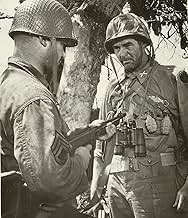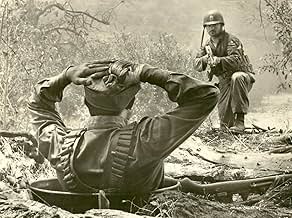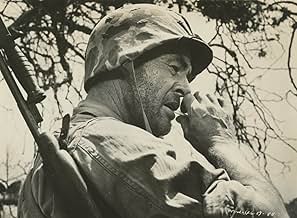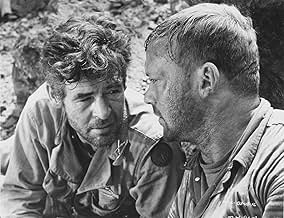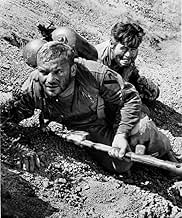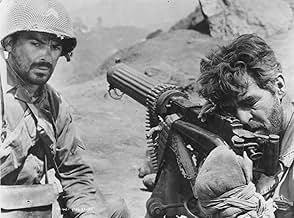AVALIAÇÃO DA IMDb
7,1/10
3,3 mil
SUA AVALIAÇÃO
Adicionar um enredo no seu idiomaDuring the Korean War, a battle-worn lieutenant and his platoon are behind enemy lines, and have orders to march to Hill 465 for possible relief.During the Korean War, a battle-worn lieutenant and his platoon are behind enemy lines, and have orders to march to Hill 465 for possible relief.During the Korean War, a battle-worn lieutenant and his platoon are behind enemy lines, and have orders to march to Hill 465 for possible relief.
- Direção
- Roteiristas
- Artistas
- Prêmios
- 1 indicação no total
Ron Brown
- Soldier with Scar on Back
- (não creditado)
- Direção
- Roteiristas
- Elenco e equipe completos
- Produção, bilheteria e muito mais no IMDbPro
Avaliações em destaque
A squad of G.I.'s, separated from their division, begin a trek of many miles trying to re-group with their comrades on a distant hill. They are harassed by snipers, sappers, and artillery barrages, but manage to reach their objective. After reaching the hill, a vicious firefight breaks out with the enemy. Excellent portrayal of the fear and horror of war.
No director I know made the scenery as much a dramatic player as Mann did. Whether it was the West in the great Westerns he directed or the imaginary Korea of this movie, it seemed as though you were in the scene yourself watching from a tree. The movie is calm, almost contemplative, and even though you could argue the soldiers were stereotypes, they were so believable and so well acted, they seemed part of the scenery as well. The danger in the movie is everywhere and nowhere at the same time, and the men die as most men do in war, carelessly, and almost wastefully. The actors are superb, totally believable, and in the case of Robert Keith heart-breaking. I recommend this film to anyone, it's simply the best largely unknown war film ever.
Men in War (1957)
Take a small group of survivors in a hardscrabble part of Korea during that neglected war and watch them squabble and worry and scramble to stay alive.
This is an admired war movie for the simple reason that it is shorn of romanticism or heroism. Not that there aren't heroic acts, and true intelligence in expert soldiering. But the acting is vivid and honest, not pandering to our need for greatness in ordinary men. And the result is that these ordinary men are great.
Robert Ryan is the star here, and he earns his keep. A smart, stubborn, hardened officer who knows the chips are down and isn't going to give in to excess or despair. The dry, open landscape with a few trees and some distant hills is almost a symbol for the movie, plain and unadorned, nothing unnecessary. The other actors are sharply seen, as well, some desperate and losing their grip, others just scared and watching, others subtle and observant.
Anthony Mann is best known in the 1950s for his Westerns, and this isn't so far from that kind of landscape and battle to survive. His earlier film noir experience must have also taught him about storytelling and character. This is sharply seen and directed. The Pentagon hated it (because it shows a disorderly military unit, according to Wiki), and wouldn't help in the production, so the only real equipment in use here is a Jeep and some guns. And this helps in the end, since it forces the movie to focus on character and the ensemble acting.
Take a small group of survivors in a hardscrabble part of Korea during that neglected war and watch them squabble and worry and scramble to stay alive.
This is an admired war movie for the simple reason that it is shorn of romanticism or heroism. Not that there aren't heroic acts, and true intelligence in expert soldiering. But the acting is vivid and honest, not pandering to our need for greatness in ordinary men. And the result is that these ordinary men are great.
Robert Ryan is the star here, and he earns his keep. A smart, stubborn, hardened officer who knows the chips are down and isn't going to give in to excess or despair. The dry, open landscape with a few trees and some distant hills is almost a symbol for the movie, plain and unadorned, nothing unnecessary. The other actors are sharply seen, as well, some desperate and losing their grip, others just scared and watching, others subtle and observant.
Anthony Mann is best known in the 1950s for his Westerns, and this isn't so far from that kind of landscape and battle to survive. His earlier film noir experience must have also taught him about storytelling and character. This is sharply seen and directed. The Pentagon hated it (because it shows a disorderly military unit, according to Wiki), and wouldn't help in the production, so the only real equipment in use here is a Jeep and some guns. And this helps in the end, since it forces the movie to focus on character and the ensemble acting.
The only problem I have of this film is that the prints I've seen are of very low quality, or perhaps the original cinematography was poor. Otherwise it is a very interesting action piece about the first days of the Korean War.
They got lucky with the cast. Who can beat Robert Ryan in a war flick role? No matter what movie he was appearing in, he always looked like he'd spent the night sleeping in a foxhole. LQ Jones is in this too, I love his face. Even Vic Morrow, he of the outstanding acting ability, makes an appearance, years before he was cast in that television masterpiece, 'Combat!' The trek of the squad through North Korean held territory plays like a thriller. The sound editing is excellent, you can make out the little noises that would play havoc with your imagination on a battlefield, where you're sweating and half crazed with nervous tension.
This was supposed to be based on a novel called "Day Without End" but I found it in a bookstore, and the screenplay has absolutely nothing to do with the original story. I always wonder why it gets a screen credit. The novel was a conventional dull novel of world war two combat, and the film is a striking and unusual,an almost psychological thriller set on the battlefield. You can do well to check this one out.
They got lucky with the cast. Who can beat Robert Ryan in a war flick role? No matter what movie he was appearing in, he always looked like he'd spent the night sleeping in a foxhole. LQ Jones is in this too, I love his face. Even Vic Morrow, he of the outstanding acting ability, makes an appearance, years before he was cast in that television masterpiece, 'Combat!' The trek of the squad through North Korean held territory plays like a thriller. The sound editing is excellent, you can make out the little noises that would play havoc with your imagination on a battlefield, where you're sweating and half crazed with nervous tension.
This was supposed to be based on a novel called "Day Without End" but I found it in a bookstore, and the screenplay has absolutely nothing to do with the original story. I always wonder why it gets a screen credit. The novel was a conventional dull novel of world war two combat, and the film is a striking and unusual,an almost psychological thriller set on the battlefield. You can do well to check this one out.
Through a combination of bad diplomacy and an understandable war weariness from World War II, the USA was caught completely off guard when the Communist North Korean government attacked the Southern forces that we were training. We had few enough forces and they were driven to what became known as the Pusan perimeter in 1950 when General MacArthur pulled off the two pronged counterattack out of the perimeter and from the landings at Inchon.
Robert Ryan is a lieutenant leading a small group of survivors who are caught behind enemy lines to safety. These GIs are not battling for any glory, but simply for survival. Also retreating are Sergeant Aldo Ray in a jeep with a shell-shocked Colonel Robert Keith. Ryan commandeers both Ray and the jeep for his needs.
Ryan is a good officer, but by the book. Ray is a good fighting man, but very insolent. The remainder of the film is how these two guys who grate on each other's nerves, but manage to work together.
The film is directed by Anthony Mann, best known for his westerns in the Fifties that mostly starred James Stewart. Men in War is probably best compared to Bend in the River. Jimmy Stewart is taking supplies to settlers for their survival and his own and Ryan is essentially doing the same thing in this film.
Ryan was a multi-faceted actor who sometimes played leads, but mostly did good character parts as bad guys. He had worked with Mann and Stewart previously in The Naked Spur where he was as bad as they come. He's just as convincing as the gritty, but decent lieutenant here. Mann and Ryan would team again the following year in God's Little Acre, a subject far removed from the Korean War.
Men in War is a good film, photographed very realistically in the outdoors and has the look and feel of a newsreel with depth.
Robert Ryan is a lieutenant leading a small group of survivors who are caught behind enemy lines to safety. These GIs are not battling for any glory, but simply for survival. Also retreating are Sergeant Aldo Ray in a jeep with a shell-shocked Colonel Robert Keith. Ryan commandeers both Ray and the jeep for his needs.
Ryan is a good officer, but by the book. Ray is a good fighting man, but very insolent. The remainder of the film is how these two guys who grate on each other's nerves, but manage to work together.
The film is directed by Anthony Mann, best known for his westerns in the Fifties that mostly starred James Stewart. Men in War is probably best compared to Bend in the River. Jimmy Stewart is taking supplies to settlers for their survival and his own and Ryan is essentially doing the same thing in this film.
Ryan was a multi-faceted actor who sometimes played leads, but mostly did good character parts as bad guys. He had worked with Mann and Stewart previously in The Naked Spur where he was as bad as they come. He's just as convincing as the gritty, but decent lieutenant here. Mann and Ryan would team again the following year in God's Little Acre, a subject far removed from the Korean War.
Men in War is a good film, photographed very realistically in the outdoors and has the look and feel of a newsreel with depth.
Você sabia?
- CuriosidadesThe men wear the patches of the 24th infantry division, which did in fact see combat in the early part of the Korean War.
- Erros de gravaçãoThe jeep is shown with a keyed ignition. Jeeps in service never had keys, the steering wheels were secured with chain and padlocks.
- Citações
Sgt. Killian: Zwickley, he's sick Sir.
Lt. Benson: Sick?... This war you're either healthy or you're dead.
- Cenas durante ou pós-créditosOpening credits prologue: "TELL ME THE STORY OF THE FOOT SOLDIER AND I WILL TELL YOU THE STORY OF ALL WARS."
KOREA SEPTEMBER 6, 1950
- ConexõesFeatured in Dear Mr. Wonderful (1982)
Principais escolhas
Faça login para avaliar e ver a lista de recomendações personalizadas
- How long is Men in War?Fornecido pela Alexa
Detalhes
Bilheteria
- Orçamento
- US$ 1.000.000 (estimativa)
- Tempo de duração
- 1 h 42 min(102 min)
- Cor
- Proporção
- 1.85 : 1(original ratio)
Contribua para esta página
Sugerir uma alteração ou adicionar conteúdo ausente

